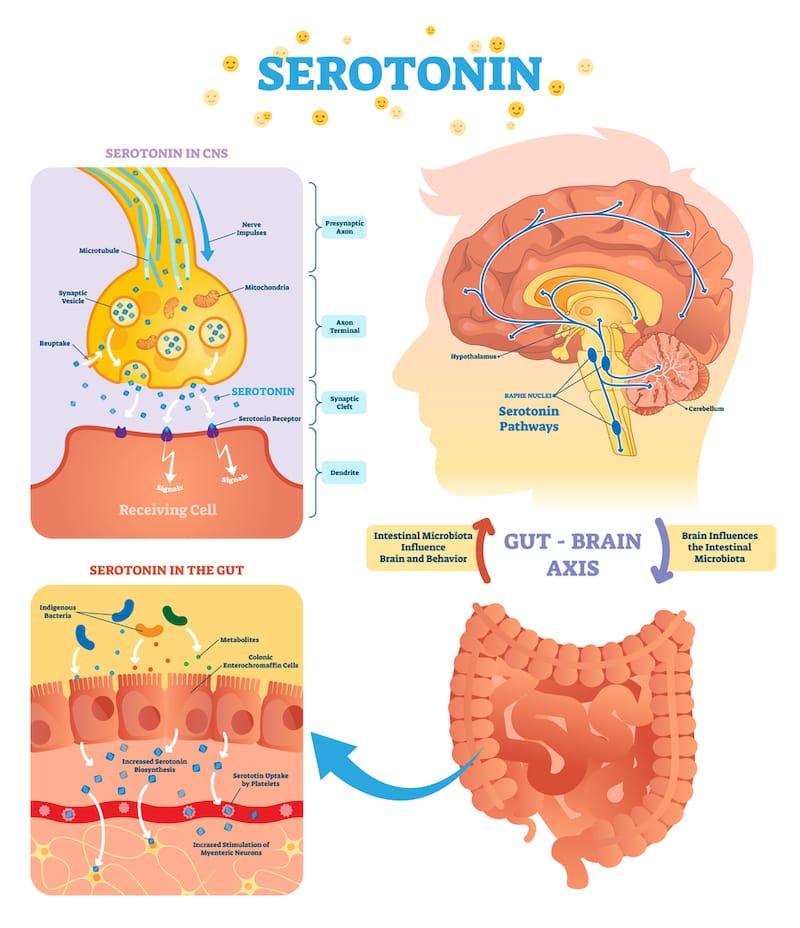Prozac is a brand name for a drug containing fluoxetine (an SSRI) used for treating patients who are depressed. Prozac and other SSRIs work by stimulating and increasing serotonin levels in the brain. In doing so, it helps cure depression but can leave some side effects ranging from mild to severe. Prozac takes 2-12 weeks to begin work, depending on individual traits, and when it starts working, you feel less anxious and more relaxed.
Fluoxetine is the main component of one of the most famous drugs in the world, Prozac.
A drug consumed by some 40 million people around the world brought about a favorable change in these people’s lives due to the beneficial effects it causes by reducing depressive symptoms.
But how does Prozac work? How Prozac feels when it starts working is always every new user’s concern because of the aim of getting out of depression. But we must discuss how long it takes to work before emphasizing its feelings.
Basically, Prozac takes up to 12 weeks to make any effect on the body, depending on the individual.
Some patients have reported noticing its feeling in one or two weeks, while it took up to 10 weeks for others.
Fluoxetine, the active ingredient in Prozac, is a Selective Serotonin Reuptake Inhibitor (SSRI) drug at the neuronal level.
Prozac’s mechanism of action is based on the inhibition of reuptake. Therefore, when Prozac starts working, you will feel less anxious and more relaxed; this helps you focus and concentrate more.
Also, your energy level gets a boost, and you will notice a more remarkable improvement in your sleep and appetites, making you have a greater interest in life.
These effects are why Prozac is an excellent choice to help you treat depression, panic disorder, and other disorders.
Unlike other antidepressants, Prozac has a magnificent effect as it acts specifically on inhibiting serotonin without producing any strange side effects, making it a clean drug for the body.
What are the side effects of Prozac?
Most side effects are mild and short-lived, usually subsidizing within a week or two after starting treatment.

In any case, the side effects that tricyclic antidepressants produce are much worse, and those that Prozac can have are nothing compared to those.
Furthermore, the side effects associated with Prozac are:
- Headaches
- Nausea
- Diarrhea
- Dizziness
- Wear and tear feelings
- Sexual disfunction (after discontinuation)
- Anxiety (on some occasions)
Ensure you notify your doctor when you notice any of these effects to avoid it from graduating to a severe impact.
In doing so, your doctor can know to recommend another antidepressant before the effect gets too severe to handle.
Below are signs of severe effects from the usage of Prozac:
- Severe dizziness
- Severe vomiting, usually dark or blood remnants
- Memory loss
- Having a suicidal thought
- Severe chest ache
- Nose bleeding that does not quickly stop
- Painful erection
- Over excitement
Ensure you report immediately to your doctor once you notice any of these.
An attempt to explain how Prozac works at the cellular level
Serotonin could be said to be the hormone of pleasure or mood hormone.

Although initially it was thought to be a vasoconstrictor, it has been seen that it works as a neurotransmitter, and among its many actions is the “regulation of the person’s mood.”
The cell membranes of nerve cells (neurons) produce neurotransmitters responsible for communicating information between neurons.
Once the action prospect reaches the axon terminal, the change in membrane potential triggers the activation of calcium channels, which increase the concentration of calcium ions in the presynaptic neuron.
This increase in intracellular calcium causes the fusion of the synaptic vesicles with the presynaptic membrane, and one or two neurotransmitters are released into the synaptic cleft.
In those involved in the emotional response, they contain 5-HT receptors that are responsible for binding to serotonin and producing a response.
The presynaptic terminal is producing neurotransmitters, which are released abroad (to another postsynaptic terminal) to cause a response, although it is a terse response.
At the end of the response, all the released neurotransmitters are returned to the presynaptic terminal.
Here, the neurotransmitter is metabolized and eliminated for continuous recycling so that the serotonin levels that initially increased (mainly due to some stimulus) would return to their normal state.
If the elimination fails or is blocked, we achieve that the neurotransmitters act longer on the neurons and increase the effects.
In people with depressive disorders, there is a failure in both excretion and reabsorption of it, so the release produced is not sufficient as would occur in a normal person.
SSRIs prevent reuptake by blocking it so that serotonin remains longer on the information receptor cells.
Thus, by inhibiting reuptake, we are increasing the basal levels of serotonin and its beneficial effects on the body.
What you need to know before taking Prozac
Before taking Prozac, you should know that you can only start treatment with it after 2 weeks of finishing treatment with an irreversible non-selective MAO inhibitor.
Also, after stopping Prozac, do not take any non-selective (irreversible MAOI) for at least 5 weeks.
If you have been prescribed Prozac for a long period or at a high dose, your doctor may consider setting a longer interval before taking an MAOI.
Furthermore, there are situations where you should not use Prozac, these includes:
- When you are allergic to fluoxetine or any of the other ingredients of this drug. If you develop a rash or other allergic reaction (such as itching, swelling of the face or lips, or shortness of breath), stop taking the tablets immediately and contact your doctor as soon as possible.
- Suppose you are using other medicines, such as irreversible non-selective monoamine oxidase inhibitors (MAOIs). In that case, a serious or fatal adverse reaction may occur.
Who can and can’t use Prozac?
Prozac is suitable for adults and kids above the age of 8 struggling with major depressive episodes, obsessive-compulsive disorder, and Bulimia Nervosa.
You can’t use Prozac if you:
- Suffer from a heart disease
- Have an eye disease such as glaucoma
- Have a history of bleeding disorders
- Suffer from epilepsy or seizures
- Suffer from low resting heart rate
- Have liver problems
- Have diabetes
FAQs
Does Prozac intake bring violent behaviors or suicide?
We must say that it is false. Fluoxetine is one of the most effective drugs because it hardly has any toxicity on the body, it does not create physical dependence, and the side effects are minor or non-existent in most cases (there are always exceptions).
However, you might’ve had these thoughts early, which increases when you use Prozac and it’s not reacting quickly.
Can Prozac affect appetite?
Changes in appetite and weight are effects of Prozac usage.
Significant weight loss, particularly in underweight depressed individuals or those with bulimia, may be an unfavorable side effect of fluoxetine hydrochloride medication.
Does Prozac cause sexual dysfunction?
Some medicines from the group to which Prozac belongs (called SSRIs) can cause symptoms of sexual dysfunction.
In some cases, these symptoms persist after stopping treatment but not always.
Conclusion
Depression is a mood disorder in which genetic, biological, and psychosocial factors are involved with alterations in neurotransmitters, cytokines, and hormones.
Therefore, you have to pay attention to how a drug used in combating it makes you feel.
In the case of Prozac, you need to report any side effect feeling to your doctor to help you determine when to stop or reshape your dosage.


